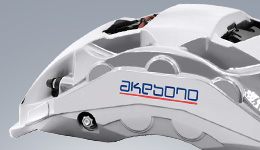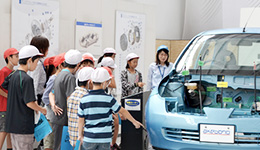Business and Other Risks
In the Akebono Group's business, risks that management believes may have a material impact on the financial position, operating results, and cash flow position are mainly as follows, and we pay attention to this in the management of the company. The degree and timing of materialization of such risks, as well as the impact of such risks on the Akebono Group's business, financial performance, and financial situation if they do materialize, are not stated because it is difficult to reasonably foresee them.
Particularly significant risks
1) Risks related to technological innovation and new product development
Aiming to expand our business in the midst of true globalization, the Akebono Group forecasts future needs and invests necessary management resources in technological innovation and new product development. However, if we fail to develop the new technologies and products needed by our customers in a timely manner due to rapid changes in the market, customer needs, or industry technologies, it may adversely affect the Akebono Group's business, financial performance, and financial situation.
Electric parking brakes are expected to rapidly grow in popularity in the future, and we are developing lightweight, compact electric parking brakes aimed at high-performance vehicles and heavy-duty vehicles that can generate high output, such as commercial vehicles, by utilizing our proprietary technologies. We are also pressing ahead with our development of electric service brakes so that we can launch them on the market ahead of our competitors. With an eye on speeding up the development of autonomous driving in the future, we are promoting electrification development by focusing on quick response, good controllability, compactness, and light weight.
We are also working on the development of brakes with a new structure, which has been newly designed from the very basic brake structure. We aim to improve the appearance and significantly reduce the weight of our existing products, and will continue to develop products that are compatible with the shift to xEVs.
Our friction material development is based on the proactive use of sustainable resources, as well as our efforts to expand our share of the copper-free friction materials market. In addition, we are promoting development of next-generation friction materials that lead the way in the reduction of brake dust, reducing size and weight including cooperation with regenerative brakes, and rollingstock field, that are areas of focus in recent years.
At the same time, we have established a dedicated department to conduct technological development using computer simulations, based on the technologies we have cultivated over the years. This will enable us to improve quality while simultaneously cutting development lead times, which will lead to greater business opportunities as we can offer new products to our customers in a timelier manner.
By focusing on these future environmental measures and promoting development that meets customer needs, we will contribute to society while reducing the risk of being outpaced by other companies in new technologies and products.
2) Risks related to production engineering and facilities
The Akebono Group is reorganizing its production sites in accordance with our business revitalization plan, and the foundation for this restructuring is our commitment to optimal production. We are making effective use of surplus facilities, consolidating operations (yosedome) between and within plants, and improving the operation rate of production facilities. In Japan, we will shift to specialized plants. As a result, in the event of damage to buildings and facilities due to natural disasters such as earthquakes, typhoons, and floods, or accidents such as large-scale fires and explosions, the inability to supplement production may delay or prevent the supply of products to customers, which can adversely impact the Akebono Group's business, financial performance, and financial situation.
Even if supplementation cannot be done domestically, it is possible with overseas plants, as below. As for the longer lead times due to the overseas locations of the supplemental plants, we will implement the necessary measures as a response to a business continuity management (BCM) crisis.
Overseas supplemental system
| Products & main parts | Domestic production plants | Overseas production plants |
|---|---|---|
| Disc brakes | Akebono Brake Iwatsuki Manufacturing Co., Ltd. (Saitama Prefecture) | Elizabethtown (USA), Mexico, Guangzhou (China), Chonburi (Thailand), Indonesia |
| Drum brakes | Akebono Brake Sanyo Manufacturing Co., Ltd. (Okayama Prefecture) | Indonesia |
| Brake pads | Akebono Brake Yamagata Manufacturing Co., Ltd. (Yamagata Prefecture) | Glasgow (USA), Suzhou (China), Chonburi (Thailand), Indonesia |
| Brake linings | Akebono Brake Fukushima Manufacturing Co., Ltd. (Fukushima Prefecture) | Indonesia |
| Cast parts | Tatebayashi Foundry (Gunma Prefecture) | Ratchaburi (Thailand) |
| Pistons | Akebono Brake Iwatsuki Manufacturing Co., Ltd. (Saitama Prefecture) | Chonburi (Thailand), Indonesia |
3) Risks related to quality
The Akebono Group believes that quality is the most important factor in supporting safety and security, and we constantly strive to build a more advanced quality assurance system. We make every effort to produce products using a perfect system, by instilling activities such as quality assurance in our own processes, learning from past malfunctions, and avoiding repetition of failures. However, the Akebono Group's products are directly related to safety, and in the unlikely event of a product defect, and the Group being unable to prevent the leakage of such products to customers, the Akebono Group's business, financial performance, and financial situation could be adversely affected due to significant expenses incurred and loss of public trust. In addition, the number of components and other parts that use advanced and complex technologies will increase due to electrification, and the purchasing of parts from external suppliers may reduce our control over quality assurance and adversely affect our credibility.
With regard to the inappropriate conduct in the periodic inspection reports on some products manufactured by our domestic manufacturing subsidiaries, as described in Issues to Be Addressed, the Akebono Group has been making every effort to restore public trust by completing the acquisition of IATF 16949 and ISO 9001 re-certification and steadily implementing measures to prevent such recurrence.
4) Risks related to disasters, etc.
The Akebono Group has many sites in Japan and overseas, each with a business continuity management (BCM) in readiness for natural disasters such as earthquakes, typhoons, and floods, as well as other situations that force us to suspend operations such as the current COVID-19 pandemic, large-scale fires, and explosions.
However, in the event of a natural disaster or epidemic of unforeseen magnitude or an accident such as a large-scale fire or explosion, production activities may face difficulties due to the impact on human resources, damage to buildings and facilities, or disruption of lifelines and information infrastructure. This may result in delays or an inability to supply products to customers, which in turn may adversely affect the business, financial performance, and financial situation of the Akebono Group, and ultimately the continuation of our business.
As a countermeasure, the Akebono Group has established a Safety & BCM Department, which is independently responsible for matters such as preparing crisis management manuals, establishing methods for confirming the safety of our associates, conducting BCM awareness activities and related disaster drills, reinforcing buildings against earthquakes for the purpose of preventing disasters and ensuring early recovery, and preventing production equipment from tipping over.
In the event of a crisis, the Safety & BCM Department takes the lead in promptly setting up a task force covering all relevant domestic and overseas sites and implementing the necessary measures.
5) Risks related to purchasing of raw materials, etc.
The Akebono Group purchases raw materials, steel materials, and parts from various external suppliers. However, soaring prices and product shortages triggered by market changes, along with stagnant supplies of raw materials, steel materials and parts caused by defects in products manufactured by suppliers, deteriorating business conditions, unforeseen accidents, and natural disasters, may cause the Akebono Group's manufacturing costs to rise or production to be delayed or suspended, which could harm the Akebono Group's business, financial performance, and financial situation.
In addition, with the shift to electrification in the market, increased trading of parts utilizing more advanced and complex technologies could complicate the supply chain and increase manufacturing costs, which could adversely affect the Akebono Group's business, financial performance, and financial position.
We will work to speed up the process of confirming the degree of supply impact in the event of an emergency by re-examining appropriate inventories in the supply chain in consideration of the impact on business continuity of natural disasters (earthquakes, flooding due to heavy rain, etc.) and accidents (fire, explosions, etc.), and by creating a supplier map.
6) Risks related to compliance
The Akebono Group strives to avoid compliance risks through various compliance activities. However, in the event of compliance problems, including violations of laws or regulations, the Akebono Group's business, financial performance, and financial situation could be adversely impacted by legal penalties, lawsuits, claims for damages, and loss of trust from stakeholders.
As a countermeasure, the Akebono Group has established a compliance promotion system through the development of the Akebono Global Code of Conduct, the Akebono Global Standards of Conduct, and compliance regulations. At the same time, each business division and manufacturing site formulates its own measures and promotes compliance activities in accordance with their respective annual action plans approved by the Compliance Committee. Various measures are also implemented to raise our associates' compliance awareness, such as labor training to prevent harassment and long working hours, and various other training to prevent subcontractor law violations and insider trading.
In addition, we have established a whistle-blowing system that includes external and internal hotlines. The information received on these hotlines is investigated as necessary and acted on appropriately. Discussions with the external hotline are received not only by the corresponding department but also by all directors, and responses and progress are reported monthly to the Board of Directors.
With regard to the inappropriate conduct in the periodic inspection report of some products manufactured by our company's domestic manufacturing subsidiaries, as described in Issues to be Addressed, we have already conducted compliance training as one of the measures to prevent recurrence, and will continue to do so while making improvements to increase the training's effectiveness.
7) Risks related to information security
The Akebono Group holds important information such as confidential information relating to product development, manufacturing, management, etc. and personal information, and there is a risk of such information being leaked due to cyber attacks, theft or loss of information equipment, or mishandling or mismanagement within the company. If such information is leaked, it could adversely affect the Akebono Group's business, financial performance, and financial situation due to loss of trust in the company, compensation for damages, legal penalties, or a decline in competitiveness.
The Akebono Group has established the Information Security Management System (ISMS) Committee as the highest decision-making body for information security, under which are staff in charge of each business division and manufacturing site. In cooperation with information systems management departments and in collaboration with overseas subsidiaries, the ISMS Committee tries to ensure thorough information management, including the prevention of information leaks.
At ordinary times, in addition to physical protection of network servers, etc., we conduct constant security monitoring by external experts on a global basis, while also conducting education, training, and awareness-raising activities to improve the level of information security for our personnel.
In the event of an emergency, the ISMS Committee, and staff in charge of each business division and manufacturing site, work closely with information systems management departments to create an emergency flow so that everything from initial response to containment and countermeasures can be implemented in a short period of time.
Recently, the number of teleworkers and telecommuters has been increasing due to the spread of the COVID-19 virus. In response to this, on the software side, we are implementing educational activities based on guidelines for teleworking and telecommuting. On the hardware side, we have made encrypted communication mandatory to prevent unauthorized access from outside, and are working to reduce risk by providing a secure network environment and restricting network access by devices other than those loaned by our company.
8) Environment related risks
The Akebono Group is taking various environmental measures to promote the Sustainable Development Goals (SDGs), but delays in responding to environmental issues or difficulties in adapting to them could undermine public trust in the Akebono Group, and this could adversely affect the Akebono Group's business, financial performance, and financial situation.
From the viewpoint of global environmental protection, we believe that addressing environmental issues is an important social responsibility as a company. To promote the SDGs, the Akebono Group has been implementing a range of environmental measures, including the development of environmentally friendly products, improvement of production facilities, and reduction of CO2 emissions.
We also view environmental issues, including climate change, as an important theme for the promotion of sustainability management, and have set mid- to long-term goals for carbon neutrality, disclosed information based on the TCFD (Task Force on Climate-related Financial Disclosures) recommendations, and taken forward-looking initiatives. The Sustainability Committee formulates policies and measures to address environmental issues, while matters judged to have a significant impact on business are reviewed by the Management Meeting and reported to the Board of Directors for supervision.
Significant risks
9) Risks related to exchange rate and interest rate fluctuations
The Akebono Group's business is importing raw materials and parts and exporting products etc. in each region. Some of the Akebono Group's assets and liabilities are denominated in foreign currencies, and although we monitor the foreign exchange balance as appropriate, it is difficult to hedge all risks, and fluctuations in these risks may affect the Akebono Group's financial performance and financial situation. The financial statements of our overseas subsidiaries and affiliates are prepared in local currencies, but translated into Japanese yen at the time of preparation of the Akebono Group's consolidated financial statements. Therefore, even if the local currency amounts remain unchanged, the amounts in our consolidated financial statements after translation into Japanese yen may be affected by the exchange rate at the time of translation. In addition, fluctuations in interest rates and securities markets may adversely impact the Akebono Group's business, financial performance, and financial situation.
10) Risks related to fluctuations in economic conditions
The Akebono Group's operating revenues are affected by the economic conditions of the countries and regions where we manufacture and sell our products. The Akebono Group's major markets are also frequently facing a number of challenges, including stagnation of economic activity due to the COVID-19 pandemic, changes in production plans of finished vehicle manufacturers due to the semiconductor shortage, delays in global marine transport, and increased geopolitical risks of war, civil unrest, conflict, insurrection, and terrorism. If these challenges persist, the Akebono Group's business, financial performance, and financial situation may be negatively affected.
In addition, the Akebono Group's business, financial performance, and financial situation may be affected by changes in the competitive environment with domestic and overseas competitors, such as changes in the composition of the industry due to government policies and CASE initiatives of finished vehicle manufacturers, aimed at a decarbonized society in the future.
11) Risks related to human resources
The Akebono Group considers human resources to be the foundation of management and implements a variety of personnel policies. However, if we are unable to develop and secure young associates, if we lose experienced associates with specific skills, if we fail to assign the right people to the right positions as planned, if motivation declines, or if the number of associates taking leave or retiring increases due to increased associate stress caused by the rapidly changing business environment, the Akebono Group's business, financial performance and financial situation may be adversely affected in the long run.
In order to keep maintaining and improving the Akebono Group's competitiveness, we believe it is important to hire human resources with expertise in highly specialized technologies and excellent management skills, and to systematically develop human resources who can pass on skills in response to an aging workforce. Especially in recent years, as we further advance our global business activities, we urgently need to develop and secure human resources who can play an active role in such an environment, so we are taking measures such as actively recruiting in Japan and overseas, enhancing training and education, and preventing the outflow of core human resources.
12) Risks related to intellectual property
If another company files a patent application or otherwise obtains the technology that the Akebono Group needs to conduct our business, we may not be able to ensure the freedom of our own business in the market and, as a result, may not be able to provide certain technologies, products, or services.
As a countermeasure, we are working to ensure our business freedom in the market by actively seeking out invention proposals and securing patents and other rights that will contribute to the development of the Akebono Group.
In addition, in the course of conducting our business, the Akebono Group may receive claims for damages for infringing the intellectual property rights of others, and this may negatively impact the Akebono Group's business, financial performance, and financial situation.
As a countermeasure, we are obligated to investigate clearance with other parties' intellectual property rights at the time of product development, which will make sure that we do not infringe on the intellectual property rights of others.
13) Risks related to business structural reforms
As described in Issues to be Addressed, the Akebono Group is implementing business structural reforms without sanctuary at all of our sites and business divisions with the aim of achieving our Business Turnaround Plan. However, if business structural reforms do not progress as planned, the Akebono Group's business, financial performance, and financial situation may be adversely affected. In addition, the investment agreement between our company and Japan Industrial Solutions Fund II (hereinafter "JIS Fund"), a Class A shareholder, includes a put option with common shares as consideration for the Class A shares. If the JIS Fund exercises this put option, the common shares held by the existing shareholders may be diluted.
The forward-looking statements presented above are based on the judgment of the Akebono Group as of June 27, 2022.







